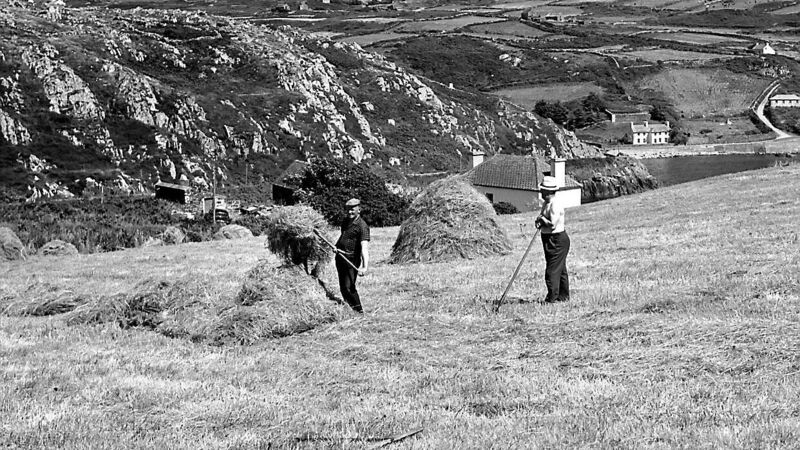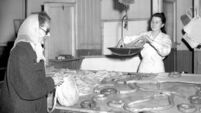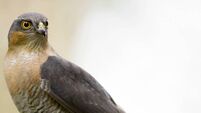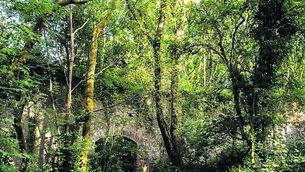As the bells tolled for Durcan, I toiled with the hay, recalling his wonderful poem

Last week and the week before were glorious. I know one old saying runs, ‘A wet and windy May fills the barns with hay’, and older generations of farmers would frown and shake their wise old heads at the very thought of cutting hay in the sacred month of May.
Then again, we were always told ‘make hay while the sun shines’ so we chanced it and it worked out fine.
We cut the Bottom Bog and half the Top Bog the previous Thursday evening so the new-mown grass got a great opportunity to undergo substantial transformation.
It was back about 60 years ago that Mam availed of a land Reclamation Grant to reclaim the two bogs. Before that they were covered with furze, briars, willow, and thorn trees. The soil was wet with a bluey-grey clay that would grip and pull anything or anyone that stood in it. It was very rough grazing.
Occasionally, in the summer the cows would be left up there. Bringing them down from the bogs was an adventure in itself! They’d be scattered here and there over the ten acres – some behind trees and bushes, playing a bovine version of hide-and-seek!
We were warned to take care and not get stuck in the bog-holes, but a child is not always wise. At least twice I plunged a leg into a sticky, gluey, gooey mucky hole. You’d think something or someone was pulling you down deep under the surface of the bog. Nothing for it, only to pull up the leg and leave the wellington disappear down into the murky underworld.
In a thousand years, maybe an archaeologist or a forensic nuclear-powered scientist will be digging in the Bottom Bog and find my wellington from 1965, and ’twill be all over the newspapers or tablets or microcosmic chips or whatever they’ll have then!

Before the turner came, I was above with my two-prong pike throwing in the headlands from under the shade of the ancient ash tree near the gate. The only sound was the buzzing of bees, busy in the noon-day heat, gathering pollen and making honey.
Two buzzards have set up ‘home’ on the ditch ’tween the two bogs - no sign of them, probably gone to the seaside in Youghal, I thought!
Then the Angelus bell rang out loud and clear from the church, just two fields away. At the same time, the bell was tolling also above in St Patrick’s Church in Ringsend in Dublin - pealing out the call to prayer and tolling in sadness for ‘Durcan the poet’ - as Seamus Heaney used to call him.
I never met Paul Durcan but read so much of his masterful writings and his voice - oh, that unique and magnificent ability to put life, meaning, and emotion into mere letters of the alphabet. I thought on that hay-day of his poem, Hay Carrier.
Have you ever saved hay in Mayo in the rain?
Have you ever saved hay in Mayo in the Sun?
Have you ever carried above your head a haycock on a pitchfork?
Yes, I’ve tried all those things with hay over the last 60 years - not in Mayo, of course, but here at home.
And I can recall above in the Path Field of a glorious day - like last week. We had the hay ‘made up’ in small grass cocks when a wind, a warm swirling wind like a mini- tornado, swept across the field and took a cock of hay up, up into the air-out over the ditch and landed it half way down the High Field.
Everyone at the work blessed themselves at this ‘si-gaoithe’ - the ‘fairy wind’. Some say it’s a special, magical, mystical wind bearing the souls of the dead from one cemetery to another to visit their kin.
The closing lines of Hay Carrier are:
For the great gate of night stands painted red -
And all of heaven lies waiting to be fed.
Who is Paul referring to in ‘all of heaven’? Is it cows awaiting the saved hay, or the hay carriers themselves, hungry after a hot day in the hayfield, or the trials of life?
Oh, the joy of poetry and hay, and maybe last Friday a gentle si gaoithe blew across Mayo as Durcan the poet was laid to rest in Aughavale.
We got the hay baled, and baled it well - you’d nearly eat it yourself!
The local Volunteer Column in 1920 were looking for a safe and remote location to ‘dump’ arms and hide from prying eyes when the conflict was intense. I never heard that my grandfather was involved with the Volunteers, but presumably he had no objection to them using a corner of a wet and wild bog for a place to shelter. The memory hangs around the bog still.
That’s another reason I’ve never ploughed that field since 1990 - leave well enough alone.
Monaghan poet Patrick Kavanagh wrote:
Sweet May is gone, and now must poets croon
The praises of a rather stupid June
- now there’s one for ya?
Methinks back the years when I was in secondary school and June meant freedom and the joy of hurling for the summer. Just because I was no good at it, didn’t mean I didn’t fall in love with it!
June meant the start of the Munster Hurling Championship - with hopes of a September Sunday in Dublin if things went right.
Some now call the season ‘split’, others call it ‘condensed’ - personally, I think it’s more ‘constipated’ than anything else - we wait and wait for something to happen and then in a sporting split second ’tis all over.
Imagine the first Saturday of June and no more Munster hurling - stupid or what?
I loved talking to old men who remembered cycling to Limerick and Thurles to big games. Thousands pedalled even all the way to Dublin when there was no alternative.
I knew men who left home of a Friday for a Croke Park Final on the Sunday. No hotels, Airbnb, hostels or ‘lodging houses’ for them in the 1940s.
For Cork people, a Utopian summer was ‘Tipp bate and the hay saved’ - well, we bate Tipp, but they are still there, we’ve the hay saved, and God is good for the rest of the summer.
The next few days I plan to spend in Lourdes with the Cloyne Diocesan Pilgrimage so I’ll light a candle for everyone’s intentions.







 App?
App?




